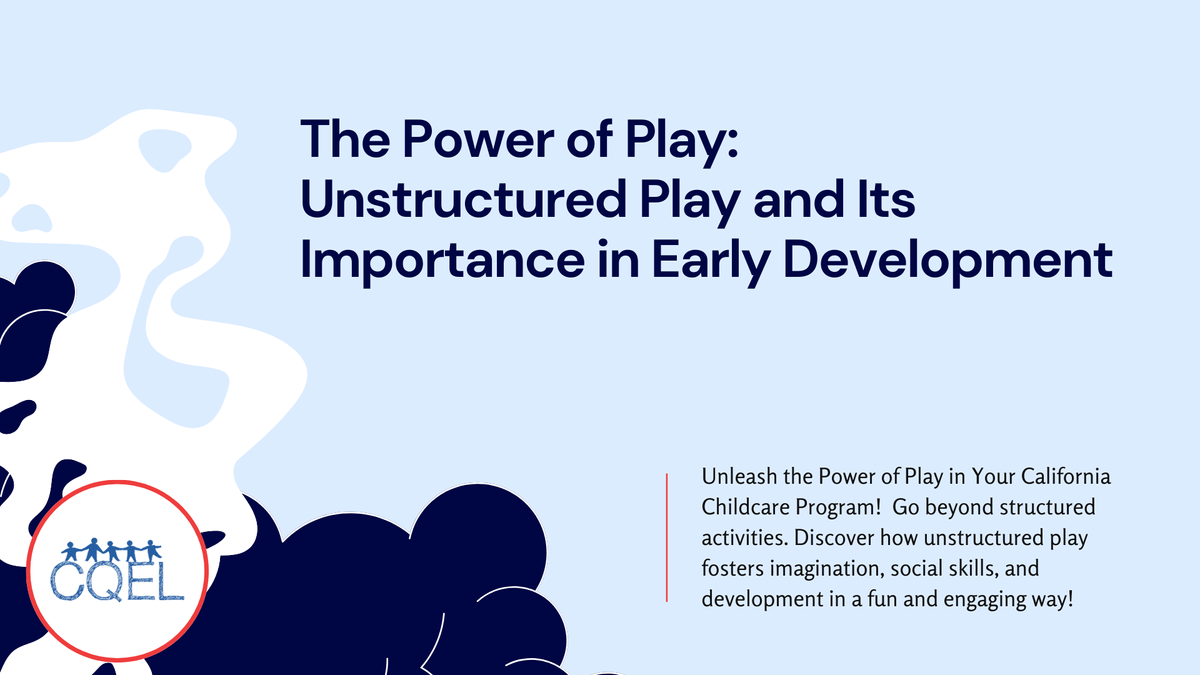The Power of Play: Unstructured Play and Its Importance in Early Development
Unleash the Power of Play in Your California Childcare Program! Go beyond structured activities. Discover how unstructured play fosters imagination, social skills, and development in a fun and engaging way!

In early childhood education, the concept of play goes beyond mere entertainment. Unstructured play, where children take the lead and create their own games and activities, holds immense significance for a child's development. Unlike structured activities with predetermined rules and goals, unstructured play allows for exploration, imagination, and a sense of ownership over the play experience. By incorporating unstructured play into your California childcare program, you're nurturing social-emotional, cognitive, and physical development in a way that is both engaging and beneficial.
The social-emotional benefits of unstructured play are undeniable. As children interact during pretend play, build elaborate structures with blocks, or navigate a social scenario during a game, they develop crucial skills like negotiation, collaboration, and conflict resolution. Unstructured play allows them to express emotions freely, experiment with social roles, and build empathy for others. This fosters creativity, imagination, and a sense of self-confidence that translates into positive social interactions throughout their lives.
Unstructured play doesn't just benefit social-emotional development; it plays a vital role in cognitive development as well. During unstructured play, children are constantly problem-solving, making decisions, and thinking critically. Whether it's figuring out how to build the tallest tower with blocks or navigating a pretend obstacle course, these play experiences challenge them to experiment, explore cause-and-effect relationships, and develop critical thinking skills. Unstructured play also encourages curiosity and a love of learning. Children are naturally drawn to explore their surroundings, and unstructured play allows them to do so at their own pace, fostering a sense of wonder and a desire to learn more about the world around them.
Physical development is another key area where unstructured play shines. Running around freely, climbing structures, and engaging in pretend games that involve movement all contribute to the development of gross motor skills. Unstructured play also allows for the development of fine motor skills. Manipulating playdough, building with small blocks, or sorting loose parts all require dexterity and coordination, laying the foundation for future writing and self-care skills.
Creating a play-friendly environment is crucial for fostering unstructured play. Instead of lining shelves with toys with specific functions and predetermined outcomes, provide open-ended materials that spark creativity. Think blocks, loose parts like natural materials or recycled objects, and art supplies that allow children to express themselves freely. While structured toys have their place, a focus on open-ended materials empowers children to take the lead and create their own unique play experiences.
Remember, your role during unstructured play is to be a facilitator, not a director. Supervise children to ensure safety, but allow them to take the lead in creating their own games and activities. Offer encouragement, answer questions, and provide assistance when needed, but avoid imposing structure or dictating how the play should unfold. The true magic of unstructured play lies in allowing children to explore their own ideas and discover the joy of independent learning.
Finding a healthy balance between structured activities and unstructured play is essential. Structured activities provide opportunities for learning specific skills and concepts, while unstructured play allows for exploration and independent development. By incorporating both types of play throughout the day, you can create a well-rounded program that caters to all aspects of a child's development.
Remember, every child has their own play style. Respect individual preferences and allow children to choose solitary play or social interaction during unstructured play time. Whenever possible, provide opportunities for outdoor play. Nature offers a rich environment for exploration, sensory experiences, and open-ended play experiences that contribute significantly to a child's overall well-being.
By embracing the power of unstructured play and creating a nurturing environment that fosters it, you can empower children in your California childcare program to learn, grow, and thrive. Witnessing the joy and development that blossoms during unstructured play is a truly rewarding experience for both children and caregivers.
